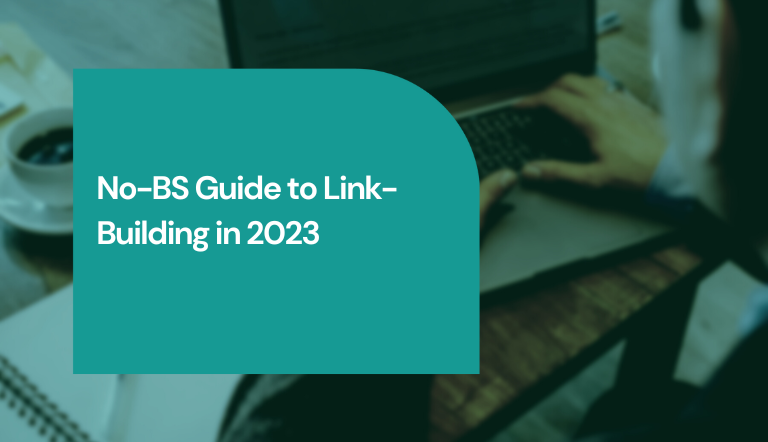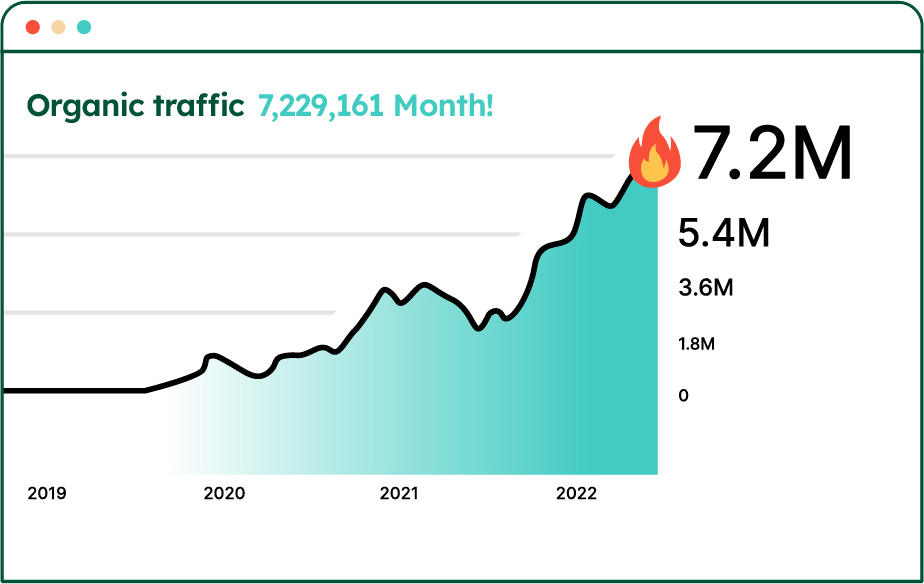Your link-building strategy can make or break your website’s rankings.
If you manage to score high authority backlinks from quality websites, your rankings are bound to increase.
Low-quality backlinks from shady websites or PBNs, on the other hand, will do your website more harm than good.
Which begs the question – what can you do to build high-authority backlinks that improve your website’s rankings?
Well, that’s exactly what we’re about to teach you!
Read on to learn:
- What is a High Authority Backlink?
- Why is Link-Building Important?
- How to Evaluate Backlinks?
- 9 Tactics for Getting High Authority Backlinks
What is a High Authority Backlink?
A high authority backlink is a link to your website that comes from a high authority domain. Such backlinks can have a significant impact on your website’s rankings on Google–much better than low-authority backlinks.
There are several different tools or metrics you can look at to determine whether a backlink is authoritative or not.
For example, you can use Moz Toolbar to check a website’s Domain Authority (DA):

That said, these metrics aren’t always accurate. The best way to evaluate whether a website is in Google’s good graces or not is to simply look at its existing rankings and link profile.
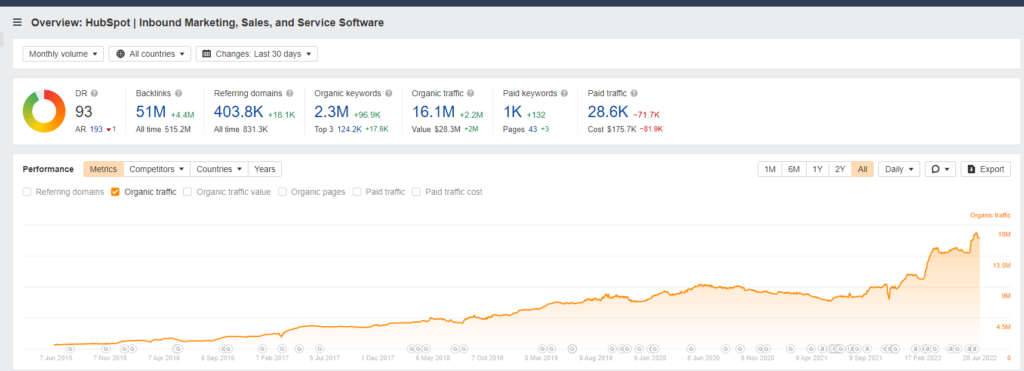
If the website has a strong backlink profile, good rankings on Google, and incoming traffic, then it’s safe to say that a link from such a site would be a high authority backlink.
Why is Link-Building Important?
These days, SEO is more competitive than ever.
Everyone has quality blog content or modern web design – which means you need to put in some extra effort for your website to stand out from the competition.
And that something extra is link-building.
Google looks at backlinks as a voucher of trust. One page linking to another means that site A thinks that site B is a useful resource, and as such, deserves better rankings.
In some of the competitive niches (CBD, VPN, etc.), it’s impossible to rank on Google unless you’re spending big sums on building backlinks.
Even in the less competitive niches, backlinks can be a game-changer. They can determine:
- Whether your website ranks #1 or #3
- If your website ranks within 3 months or 1 year
How to Evaluate Backlinks?
Sometimes, even high authority backlinks can have zero (or worse, negative) impact on your website.
So, it’s normal if you are thinking: “What gives?”
Well, authority isn’t everything. Google evaluates backlinks using several different criteria, with authority being only one of them.
Here’s a complete checklist on how to evaluate a backlink and decide whether it’s worthwhile or not:
- Website’s topical relevance. If your website is about, say, VPNs, and you get a backlink from an accounting blog, you won’t get much value out of it.
- Page topical relevance. Just like the previous point, the topic of the page you’re getting a link from matters. E.g. if the page is a post about cooking and it’s linking to your guide about skin care, then the link will have zero impact.
- DA or DR. The website’s authority is determined via Ahrefs, SEMrush, or Moz. The higher it is, the better it’ll impact your site.
- Website rankings. If a website ranks well on Google, chances are, it’s in Google’s good graces, and a link from there will be handy.
- Page metrics. A backlink from a page with ten links on its own and solid rankings on Google is more relevant than a link from a page with no backlinks of its own.
- Whether the website is a link farm. If a website links to too many other sites, then it might be a link farm. Link farms have next to no impact on your site’s rankings.
- If the link is do-follow. Google bot disregards backlinks marked as “no-follow” or “sponsored.”
Topical relevance matters more than you’d think.
A backlink from a medium authority website (with high topical relevance) is much more likely to boost your rankings than a link from a high authority website that’s not topically related to your website.
How to Get High Authority Backlinks – 9 Tried-and-Tested Tactics
#1. Create Quality Content
Let’s start with the basics.
Getting high authority backlinks is so much easier when you have quality resources to build these links to.
Let’s say you’re doing outreach, asking for a backlink to one of your new blog posts. Which of these two do you think is a blogger likely to link to?
- A 3,000-word, well-formatted blog post with examples, visuals, and so on.
- A generic 500-word listicle.
The first one, right?
Well, chances are, just about every website manager would also agree with you.
If your resource is something that makes them go “wow!” then they’ll be way more likely to link to it.
#2. Do ABC Backlink Swaps
An ABC link swap, also known as the 3-way link exchange, is a very simple but effective way to build high authority backlinks.
If you’ve done link-building outreach before, you’ve probably noticed that a lot of website owners ask for something in return for a link.
This is pretty reasonable – these days, everyone knows the value of a good backlink.
So, if you don’t want to have to pay for the backlink, you can offer an ABC link swap instead.
The way this works is this:
- Your website links to Website B
- Website B links to Website C
- Website C links to your website
This way, all 3 of the websites get a backlink, without any of the link exchanges being a direct exchange (something that Google disapproves of).
#3. Create Infographics
Using and promoting infographics is a great way to build backlinks at scale.
See, with a conventional tactic like guest posting, you have a very significant downside: for each guest post that you want to publish, you’ll need to hire a writer to write out that post.
This process can get very time-consuming and expensive.
If you’re promoting an infographic, however, all the website owner has to do is insert it to their website and link back to your site – with zero spending required (outside the fee for the infographic designer).
One of our clients used infographic promotion to build a ton of backlinks to their website. They created a resume infographic of Elon Musk and pitched it to publications like Business Insider.
This resulted in a TON of press coverage and features, which translated into high-authority backlinks and increased rankings.
#4. Create Statistics Round-Up Posts
When looking for authority sources for their blog posts, content creators look for relevant statistics on Google.
For example, if you were writing a post about link-building (like this one), you’d likely look up “link-building statistics” to find quality sources to mention within the article.
At this point, you’ve probably caught on to what we’re trying to say here.
To get content creators in your niche to link to you, you should create a listicle of popular statistics associated with your topics.
Backlinko did exactly this with their post about SEO statistics, which currently has over 600 backlinks:
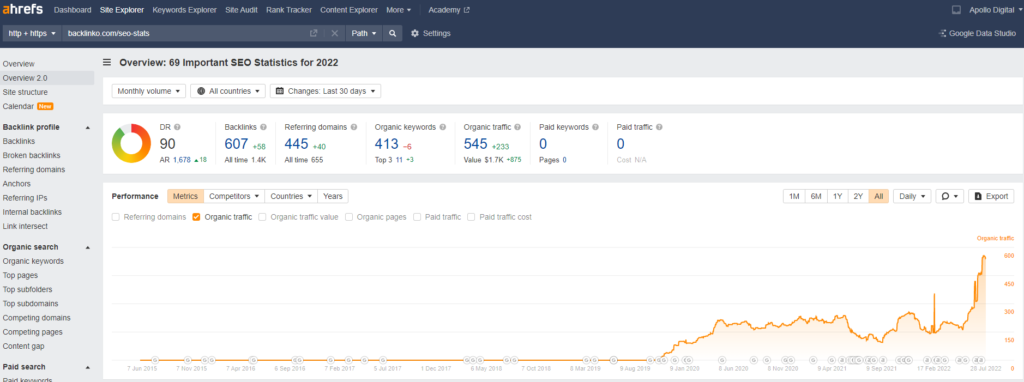
While some of these links are likely from their existing audience, chances are, a big chunk of them are simply from content creators who were looking up stats about SEO.
#5. Take Advantage of Your Proprietary Data
Does your company have any proprietary data from your users?
Big media publications might be interested in that!
The gist of this technique is as follows:
You deep-dive into your data and see if you can find any new trends that a journalist would be interested in covering.
Then, you simply reach out to journalists who’ve written about your niche before and pitch the news.
OkCupid, a dating website, used this exact strategy to gain PR, backlinks, and a ton of traffic from media publications.
They analyzed the dating preferences of their user base and found interesting bits of information, like which demographics were more likely to date each other. Then, they turned this information into infographics or charts and pitched them to big media companies like The New York Times and others.
#6. Use HARO as a Source
HARO, or Help a Reporter Out, is a marketplace journalists use to find sources.
Journalists submit a query looking for a source related to an article they’re writing, and sources reach out with a pitch on how they can contribute to the topic.
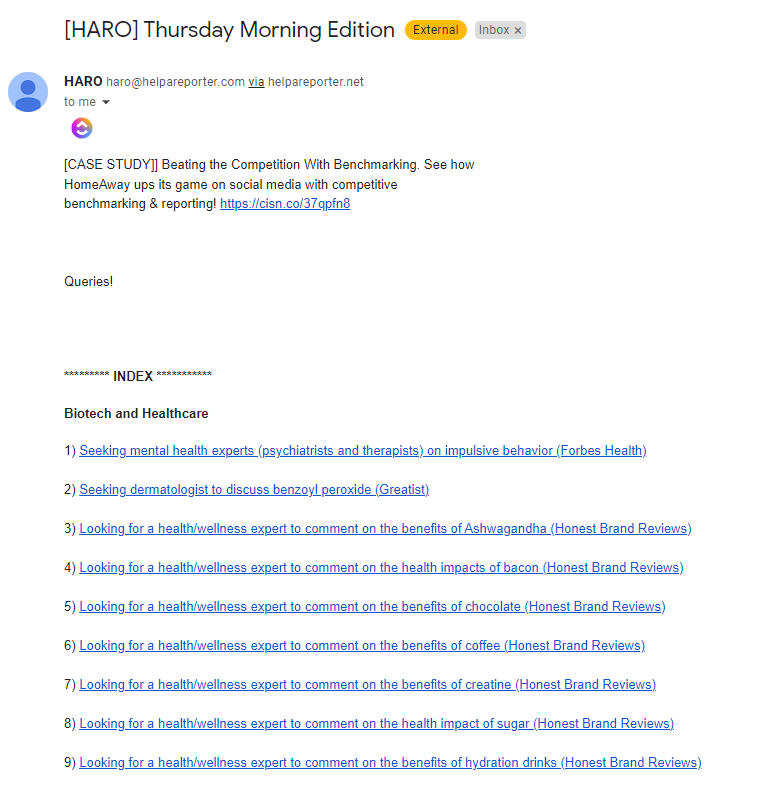
As for how you can use HARO, it’s relatively straightforward. Simply register, start receiving the source requests, and reply whenever you have something that would add value for the journalist.
HARO SEO is a numbers game. Chances are, your first, second, and even fifth pitch is going to be ignored. If you stick with it for the long term, though, then you can (potentially) generate about a dozen high-authority backlinks per month.
#7. Create Round-Up Posts Using HARO
Another way to use HARO to build high authority backlinks is to register as a journalist and use it to create round-up posts.
Here’s how this works:
- You pick a topic for a round-up post. E.g. If we were doing such a post, it could be “Top X Most Common SEO Mistakes.”
- You register as a journalist and submit a query looking for sources to contribute to the topic. In our case, we’d ask them to pitch in with the most common SEO mistakes they’ve seen.
- Pick out the sources that gave you the best answers and feature them in your new article.
Then, within a month or two, you can get back to these sources asking for a favor back. This can either be a link back to your site, an ABC link exchange, or anything along those lines.
#8. Do Broken Link-Building
Broken link-building is one of the oldest techniques out there, but even in 2022, it still works like a charm.
Here’s how this is done:
First, make a prospect list of websites that you want to get a backlink from.
Then, run them through Ahrefs Broken Link Checker to see whether there are any broken links on the site. For example, if we run Backlinko.com through Ahrefs, you’ll see that even one of the biggest SEO resources on the internet has broken outgoing links.
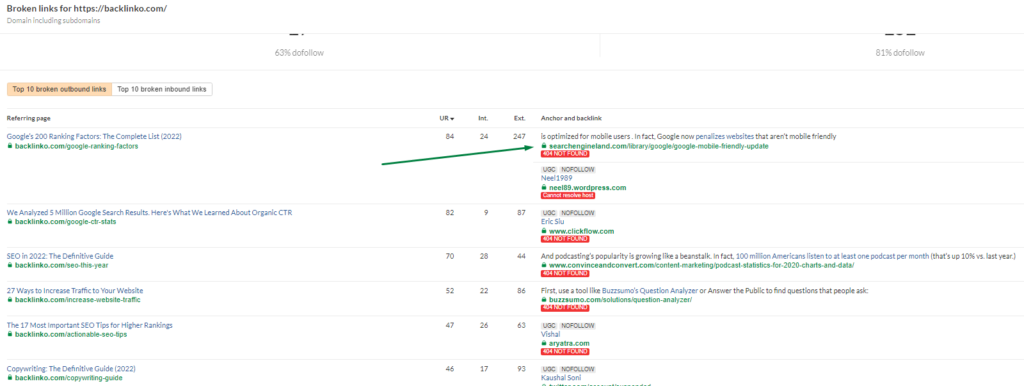
In this case, the relevant broken link is the first one. If you have a blog post on your site about how Google penalizes websites that aren’t mobile-friendly, then this is a very simple request.
All Backlinko has to do is replace the broken link with yours, which is something that is going to take them a couple of seconds.
That said, just like other high authority link-building techniques, this one’s also a numbers game. While Backlinko isn’t very likely to reply to your pitch, some other websites with similar broken links might.
The more broken link-building outreach you do, the more likely it is that you’ll succeed.
#9. Promote Your Content on Social Media
This one might seem a bit counterintuitive, but hear us out.
One of the most effective ways to build links is to get people to read your content. The more people read your blogs, the more likely it is that some of them like your articles, and end up organically linking to them.
So, whenever you publish a new post that’s particularly interesting or authoritative, make sure to:
- Repost the content on your social media (Facebook, Twitter, LinkedIn).
- Promote your content to your email list.
- Repurpose it for Reddit and submit it to the relevant community.
- Submit the post on HackerNews, GrowthHackers, or any other relevant platform.
- Share the content on Facebook groups in your niche.
For more on social media content promotion, check out this article by Buffer.
Key Takeaways
And that about sums it up!
That should be about all you need to build high-authority backlinks. Before you go, here’s a quick recap of everything we’ve covered so far:
- A high authority backlink is a link from an authoritative website.
- Building backlinks is essential if you want your website to rank well on Google and to drive traffic.
- Being a high authority, however, is not enough. You also want your backlinks to be from sites and pages contextually related to yours.
- There are a ton of ways to build high authority backlinks, but some of our favorites are doing ABC swaps, using HARO, doing broken link-building, and others.


